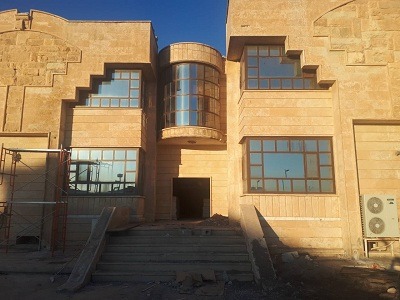As part of a shared commitment to help rebuild the threatened ethno-religious minorities in Iraq, in November 2019 the World Council of Arameans (Syriacs) (WCA) partnered with the U.S. Agency for International Development (USAID) to support a critically important project in the largely Aramean town of Bartella in the Nineveh Plain.
At the end of last year, WCA joined USAID in helping the reconstruction of the community center (ca. 40 x 40 meters, two stories and 6,5 meters high) in this northern Iraqi town through the Bartella Reconstruction Committee (BRC). The building, which will be completed in the coming months and to which USAID donated $250,000 and WCA $100,000, belongs to the Syriac Orthodox St. Shmuni Church and holds great importance to the indigenous Aramean (Syriac) community of Bartella and its surrounding villages in the Hamdaniya district.
After Bartella was seized by ISIS in early August 2014 and liberated from its control on 20 October 2016, the BRC was founded in 2017 to rebuild the town’s homes, shops, churches and infrastructure. The reconstructed building, which was transformed by ISIS into a training ground for its fighters, used to be a socio-cultural centre, where many Christians and other minorities in the region came together for their weddings, holiday celebrations, school plays, student recognition ceremonies, poetry nights, art book fairs, and more.
Before the ISIS invasion, Bartella, which lies some 21 km east of Mosul, had a population of about 30,000. Since its liberation, only 5,000 Arameans have returned, of whom 80% are Syriac Orthodox and 20% Syriac Catholics. Some 1,750 (35%) of the current total population of 6,750 inhabitants consist of Shia Shabaks, who have increased substantially in the last two decades.
Despite its delay due to the coronavirus pandemic, the project will contribute to the revival of the town and attract many of Bartella’s displaced families. Upon its completion, the community will continue to search for the required funding to rebuild some hundred homes that have been completely destroyed by ISIS and which will cost $40,000 per house to be reconstructed.
Less than two weeks ago, the new Iraqi Prime Minister Mustafa al-Kadhimi called on the Christians to come back home now that ISIS has been defeated. He has pledged assistance to “the original children of the country” who are willing to stay in or return to their homeland.
The President of the World Council of Arameans (Syriacs), Johny Messo, states: “We do whatever we can to help our people to stay in the homeland and rebuild their lives. However, our aid is merely a drop in the ocean. As one of Iraq’s most ancient, affected and vulnerable communities, the final remaining Arameans and their dying Aramaic language need and deserve so much more support from both the Iraqi government and the international community.”
The Christians of Iraq, who still speak Aramaic as their mother tongue in daily life and use a literary dialect in their church services, have declined from 1,4 million in 2003 to less than 200,000 at present. Before 2003, after earlier underreported exoduses of Christians from the country, there were 1.4 million Christians left in Iraq, making up 5.4% of its overall population of 26 million. Today, 17 years later, the country has less than 200,000 Arameans, a shocking drop of 85% and a mere 0,5% of Iraq’s rapidly growing total population of 40,2 million!
Since 1983, WCA is the global umbrella federation of the Aramean (Syriac) people. Since 1999, it is an NGO in Special Consultative Status with the Economic and Social Council of the United Nations. WCA continues to support and represent the interests of the Aramean people, who are native to Syria, Iraq, Southeast Turkey and Lebanon. A notable example is that since late 2013, WCA and its Federation in Germany moved the German government to set up humanitarian aid programs for the Arameans in Damascus, Homs, Northeast Syria and North Iraq until today, totalling over 12 million euro.
Source: wca-ngo.org






